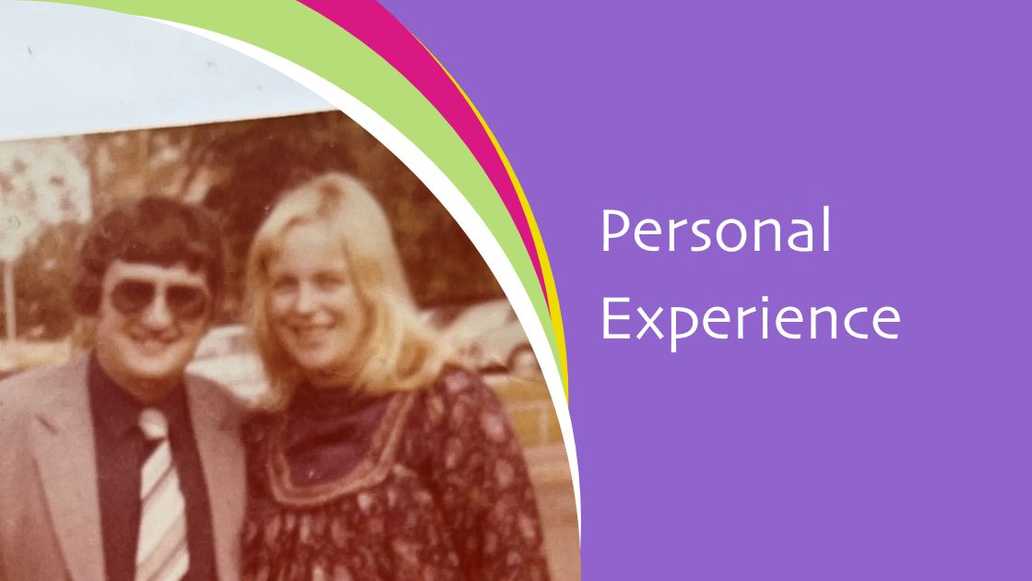
It was a normal Wednesday morning in March 1976. My husband and I had been married for nearly three years and had begun to discuss the possibility of starting a family. We were in the middle of relocating from the Midlands to the North East due to my husband’s job as a church minister. The previous month, my mother-in-law had died unexpectedly, so it was a time of uncertainty and change.
I had noticed certain changes in my body which, as a nurse, I knew could possibly be indicators that I was pregnant. My period was lighter than usual, but I ultimately put this down to the stress of losing my mother-in-law.
At about 9am, I was upstairs packing when I suddenly experienced excruciating lower abdominal pain. My husband was downstairs doing sermon preparation, so I shouted down to him. He quickly ran upstairs and helped me onto our bed; however, with every passing minute, the pain was becoming more severe. Although there was no blood loss or discharge, we began to suspect I was having an early pregnancy miscarriage. Our GP (doctors) surgery was at the bottom of our road, so my husband ran back downstairs to fetch the doctor. In the days before paramedics, a GP was always the first port of call in a medical emergency, particularly if they were very close.
Realising how serious the situation was becoming, my husband first knocked on our neighbour’s door to ask her to stay with me while he fetched the doctor. By the time my husband reached the GP surgery, it was 9.30am. He explained that I had collapsed and that we needed the doctor quickly, to which he replied, “I will come when surgery is finished,” and returned to his work.
By the time the GP arrived at our house, it was 11am. At this point, my husband said my face had turned a blue colour he had never seen before, and I was in the worst pain I had ever known. The doctor looked at me, placed one hand on my stomach, and said, “She’s having an ectopic pregnancy.” As a nurse, the only time I had ever encountered an ectopic pregnancy, the patient had died.
The doctor went downstairs to phone the ambulance, and as he did so, I drifted out of consciousness. As I was drifting, I began to think of a hymn I had once heard about going to heaven. I suddenly realised I was dying. As strange as it sounds, I had never felt so peaceful. The pain had gone, and my Christian faith meant I found I was experiencing no fear of death.
I regained consciousness and told my husband I was going. He replied, “Yes, you’re going to hospital,” to which I responded, “No, I am going to heaven.”. My husband started to cry. At that moment, I remembered that he had only just lost his mother, and I began to pray that I would survive. The peaceful feeling remained, however, and I felt like I was being carried.
The ambulance eventually arrived, and the men strapped me into a chair and put me in the vehicle. My husband later told me that at this point, my face turned even more blue than before. He sat next to me in the ambulance, and I had enough awareness to tell him to continue to talk to me and not let me fall asleep.
On my arrival at the hospital, staff members asked me questions about myself, but I just couldn’t answer them, instead telling them to ask my husband. There was a member of staff at each of my limbs, all trying unsuccessfully to get a cannula in. I remember thinking at the time, “They’re not very good at this,” but of course, I later realised the problem was that all my veins were collapsing. Eventually, I heard a shout, “I’m in!”. My husband later told me he saw them give me four units of blood once the cannula was in.
About 15 minutes later, I was taken to theatre. As they wheeled me into the operating room, I stopped breathing, and my heart stopped beating. Having probably been bleeding internally for most of the morning, I had lost more than half the blood volume in my body. The histology would show that the rupturing of the Fallopian tube had caused a bullet-like injury. As the registrar later told my husband, at this point, I was dead.
Working hard to bring me back, the hospital staff intubated me and performed CPR whilst the surgeons removed my Fallopian tube and ovary. They stemmed the bleeding and began to stitch me up. My body began to function again.
The next thing I really remember, it was about half past three in the afternoon. My lovely dad arrived at my bedside and gently said my name and touched my arm, at which point I awoke and said, “Hello, Dad.” My husband, who had been by my side the whole time, said he knew at this point I was going to be okay.
Grateful to have survived, I am glad I didn’t know at the time the struggles we would go through before I eventually had a baby. It would be four years of infertility before we finally became parents.
If I could say one thing...
My journey to motherhood was longer after my ectopic pregnancy, but I got there in the end.
Thank you to Ruth for sharing her experience. If you would like to share your experience of ectopic pregnancy, please visit our guide for more information.
Please remember our support services are available at any time.